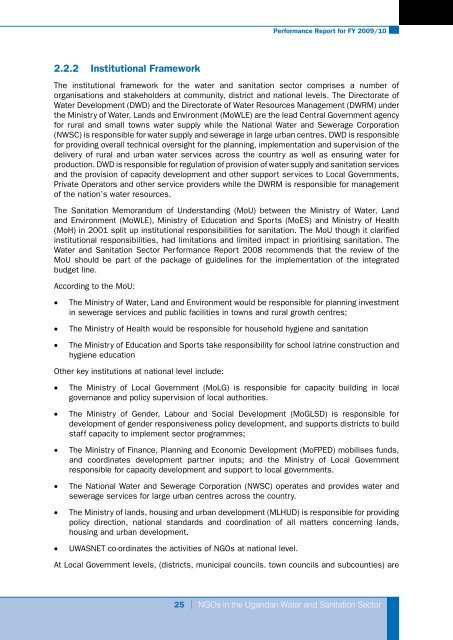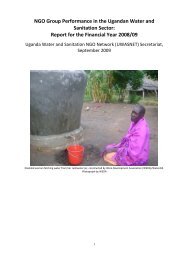Performance Report for FY 2009/10 - UWASNET
Performance Report for FY 2009/10 - UWASNET
Performance Report for FY 2009/10 - UWASNET
Create successful ePaper yourself
Turn your PDF publications into a flip-book with our unique Google optimized e-Paper software.
2.2.2 Institutional Framework<br />
<strong>Per<strong>for</strong>mance</strong> <strong>Report</strong> <strong>for</strong> <strong>FY</strong> <strong>2009</strong>/<strong>10</strong><br />
The institutional framework <strong>for</strong> the water and sanitation sector comprises a number of<br />
organisations and stakeholders at community, district and national levels. The Directorate of<br />
Water Development (DWD) and the Directorate of Water Resources Management (DWRM) under<br />
the Ministry of Water, Lands and Environment (MoWLE) are the lead Central Government agency<br />
<strong>for</strong> rural and small towns water supply while the National Water and Sewerage Corporation<br />
(NWSC) is responsible <strong>for</strong> water supply and sewerage in large urban centres. DWD is responsible<br />
<strong>for</strong> providing overall technical oversight <strong>for</strong> the planning, implementation and supervision of the<br />
delivery of rural and urban water services across the country as well as ensuring water <strong>for</strong><br />
production. DWD is responsible <strong>for</strong> regulation of provision of water supply and sanitation services<br />
and the provision of capacity development and other support services to Local Governments,<br />
Private Operators and other service providers while the DWRM is responsible <strong>for</strong> management<br />
of the nation’s water resources.<br />
The Sanitation Memorandum of Understanding (MoU) between the Ministry of Water, Land<br />
and Environment (MoWLE), Ministry of Education and Sports (MoES) and Ministry of Health<br />
(MoH) in 2001 split up institutional responsibilities <strong>for</strong> sanitation. The MoU though it clarified<br />
institutional responsibilities, had limitations and limited impact in prioritising sanitation. The<br />
Water and Sanitation Sector <strong>Per<strong>for</strong>mance</strong> <strong>Report</strong> 2008 recommends that the review of the<br />
MoU should be part of the package of guidelines <strong>for</strong> the implementation of the integrated<br />
budget line.<br />
According to the MoU:<br />
• The Ministry of Water, Land and Environment would be responsible <strong>for</strong> planning investment<br />
in sewerage services and public facilities in towns and rural growth centres;<br />
• The Ministry of Health would be responsible <strong>for</strong> household hygiene and sanitation<br />
• The Ministry of Education and Sports take responsibility <strong>for</strong> school latrine construction and<br />
hygiene education<br />
Other key institutions at national level include:<br />
• The Ministry of Local Government (MoLG) is responsible <strong>for</strong> capacity building in local<br />
governance and policy supervision of local authorities.<br />
• The Ministry of Gender, Labour and Social Development (MoGLSD) is responsible <strong>for</strong><br />
development of gender responsiveness policy development, and supports districts to build<br />
staff capacity to implement sector programmes;<br />
• The Ministry of Finance, Planning and Economic Development (MoFPED) mobilises funds,<br />
and coordinates development partner inputs; and the Ministry of Local Government<br />
responsible <strong>for</strong> capacity development and support to local governments.<br />
• The National Water and Sewerage Corporation (NWSC) operates and provides water and<br />
sewerage services <strong>for</strong> large urban centres across the country.<br />
• The Ministry of lands, housing and urban development (MLHUD) is responsible <strong>for</strong> providing<br />
policy direction, national standards and coordination of all matters concerning lands,<br />
housing and urban development.<br />
• <strong>UWASNET</strong> co-ordinates the activities of NGOs at national level.<br />
At Local Government levels, (districts, municipal councils. town councils and subcounties) are<br />
25 | NGOs in the Ugandan Water and Sanitation Sector



